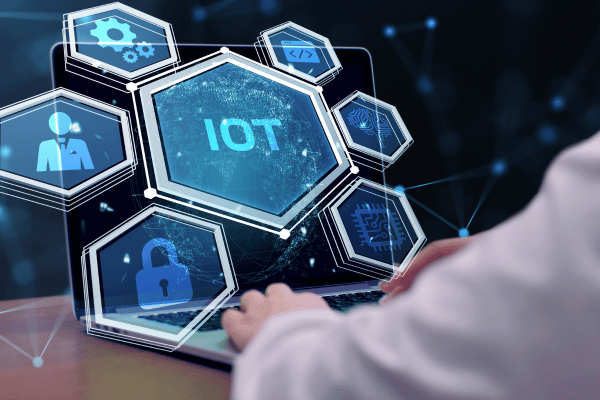
In recent times, the Internet of Things (IoT) has continuously woven itself into the fabric of various sectors, transforming operational landscapes and fostering an environment of seamless interactions between the physical and digital worlds. The realm of academia is not untouched by this digital renaissance, where IoT has found its footing, promising a paradigm shift in how educational ecosystems operate and evolve.
Understanding IoT and its Relationship with AI
The IoT is a growing network of interconnected devices and systems capable of collecting and exchanging data. It’s a realm where physical objects are seamlessly integrated into the digital fabric, enabled by suitable electronics, software, sensors and network connectivity. Each thing is uniquely identifiable through its embedded computing system but interoperates within the existing internet infrastructure.
Adjacent to the evolution of IoT is the ascent of Artificial Intelligence (AI). AI and IoT are twin engines propelling the digital transformation journey. While IoT provides a link of interconnected data sources, AI brings in the capability to make sense of this vast data in real-time, converting raw data into actionable insights. The fusion of AI and IoT, often referred to as Artificial Intelligence of Things (AIoT), stands to redefine the data-driven process in academia, offering a canvas of possibilities for enhancing personalized learning, research innovation and operational efficiency.
The Resurgence of Research
One cannot overlook the substantial impact IoT has on research endeavours within academic circles. The availability of real-time data, fetched from an array of sensors and devices, has propelled research into uncharted territories. Researchers now have the tools to collect and analyze data with an efficiency and precision that was previously unattainable.
According to a report by Statista, the IoT market’s revenue in Canada is projected to reach US$5.89bn in 2023. It’s expected to show an annual growth rate of 11.28% from 2023 to 2028, resulting in a market volume of US$10.05bn by 2028, a testament to the escalating adoption and investment in IoT technologies.
Modern Classroom: A Learner-Centric Ecosystem
The modern classroom is undergoing a metamorphosis, courtesy of IoT. The traditional lecture model is making way for a more interactive, learner-centric approach. With smart classrooms, students and educators are embracing a more engaging learning experience. IoT Devices such as smart boards and connected lab equipment are facilitating a dynamic interaction between learners and the academic material at hand.
Moreover, IoT’s role in creating adaptive learning environments cannot be understated. It aids in crafting personalized learning pathways, ensuring that the educational needs of every student are met.
Operational Optimization and Safety Assurance
Beyond the immediate classroom, IoT is instrumental in fostering a conducive learning environment. By optimizing energy consumption through smart lighting and heating systems, institutions are not only reducing operational costs but also contributing towards a sustainable and eco-friendly campus.
Additionally, predictive maintenance, powered by IoT, ensures that critical infrastructure and facilities are functioning optimally, reducing downtime and enhancing the overall academic experience.
The safety and security of the academic community are paramount, and here too, IoT is making significant strides. By employing connected surveillance systems and real-time monitoring, institutions can ensure a secure and conducive environment for both learning and research.
Administrative Efficiency
The administrative echelons of academic institutions stand to gain substantially from IoT adoption. The automation of routine tasks, real-time monitoring of institutional resources and data-driven decision-making are but a few avenues through which IoT is streamlining administrative workflows.
Challenges and the Path Forward
Amidst these advancements, it’s pertinent to address the challenges that accompany the integration of IoT in academia. Privacy concerns, data security and the requisite for investments in infrastructure are hurdles that need astute attention. The onus is on the academic institutions to foster a culture of awareness and adherence to best practices concerning data handling and cybersecurity.
As IoT continues to engrain itself in academia, the symbiosis between these two realms is becoming increasingly evident. The potential for IoT to drive academic excellence, foster innovation and contribute towards a sustainable educational landscape is immense. The narrative of IoT and academia is still unfolding, with each chapter promising a blend of challenges and opportunities, pushing the frontiers of what’s possible in the academic domain.
Interested in learning more about the world of the Internet of Things?
Consider these educational programs in Canada:
Canadian College of Business and Technology (CCTB)
Diploma in Data Engineering and Analytics with Co-op: This program helps students gain the knowledge, practical experience and confidence of a data expert. Data engineers transform raw data into accessible data for machine learning, IoT, AI and analytics systems.
Trebas Institute Ontario Inc. & Trebas Institute Quebec Inc.
Data Analytics with Co-op (Ontario) & Analytics, Big Data and Business Intelligence (Quebec): These programs enable students to set up networked and automated databases, operate data warehouses and perform refined analyses.
Toronto School of Management (TSoM)
Diploma in Data Analytics with Co-op: This program teaches students to analyze data using cutting-edge technology to drive proactive decision-making and optimize business performance.

